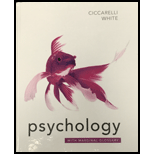
Introduction:
Researchers Masters and Johnson identified four phases of a sexual-response cycle. Excitement, plateau, orgasm, and resolution are the four stages in sexual-response.
Answer to Problem 10TY
Correct answer:
The refractory period is that time during which a man cannot have another erection. This information is reflected in the option “b”. Therefore, option b. is correct.
Option b. is given as “a man cannot have another erection”.
Explanation of Solution
Reason for the correct statement:
Resolution phase is the final phase in sexual response which involves body returning back to its normal state as it was before arousal. In females clitoris retracts, the color of vaginal lips return back to normal, and the vaginal lips close. In males, testes descend back, and erection is lost. Men also have a refractory period, which lasts from several minutes to hours during which they cannot reach another erection. Refractory period extends with the age of men. The older a man gets, the longer is the refractory period.
Hence, option b. is correct.
Reasons for the incorrect statements:
Option a. is given as “a woman cannot have another orgasm”.
Women can achieve several orgasms if stimulated. The refractory period is not a period in which women cannot achieve another orgasm. Hence, it is a wrong answer.
Option c. is given as “a man can be erect but not have an orgasm”.
Men can have an only a single intense orgasm. In refractory period men cannot achieve another erection. Hence, it is a wrong answer.
Option d. is given as “a woman cannot be aroused”.
Women do not have a refractory period and can achieve another set of orgasm. Hence, it is a wrong answer.
Hence, options a., c., and d. are incorrect.
The time duration during which men cannot achieve another orgasm is called the refractory period.
Want to see more full solutions like this?
Chapter 10 Solutions
PSYCHOLOGY:MARG.GLOSS.-W/ACCESS>CUSTOM<
- what makes the candomble tradition stand out?arrow_forwardby observing behavior students in class , what your thoughts about the effectiveness and purpose of the work being done there?arrow_forwardWhen would using checklists and rating scales be most appropriate in early childhood? Use scholarly sources.arrow_forward
- I need help with two articles are there any similarities and differences between the two https://www.phnompenhpost.com/business/indian-ambassador-pledges-increased-trade-tourismpromotion, https://time.com/5486460/pol-pot-cambodia-1979/arrow_forwardEvaluate the application of behaviourism and cognitive psychological perspectives to contemporary issues in psychology.arrow_forwardAnalyse the similarities and the differences between behaviourism and cogniperspectives in psychology.arrow_forward
- Describe behaviourism and cognitive psychological perspectives.arrow_forwardEvaluate the key assumptions of behaviourism and cognitive psychological perspectives.arrow_forwardable to help me with this for revision purposes and used reference in APA Required reading: • McKevitt, G. (2024, September 2). https://www.bbc.com/culture/article/20240829-the-life-changing-day-world-war-two-beganarrow_forward
 Ciccarelli: Psychology_5 (5th Edition)PsychologyISBN:9780134477961Author:Saundra K. Ciccarelli, J. Noland WhitePublisher:PEARSON
Ciccarelli: Psychology_5 (5th Edition)PsychologyISBN:9780134477961Author:Saundra K. Ciccarelli, J. Noland WhitePublisher:PEARSON Cognitive PsychologyPsychologyISBN:9781337408271Author:Goldstein, E. Bruce.Publisher:Cengage Learning,
Cognitive PsychologyPsychologyISBN:9781337408271Author:Goldstein, E. Bruce.Publisher:Cengage Learning, Introduction to Psychology: Gateways to Mind and ...PsychologyISBN:9781337565691Author:Dennis Coon, John O. Mitterer, Tanya S. MartiniPublisher:Cengage Learning
Introduction to Psychology: Gateways to Mind and ...PsychologyISBN:9781337565691Author:Dennis Coon, John O. Mitterer, Tanya S. MartiniPublisher:Cengage Learning Psychology in Your Life (Second Edition)PsychologyISBN:9780393265156Author:Sarah Grison, Michael GazzanigaPublisher:W. W. Norton & Company
Psychology in Your Life (Second Edition)PsychologyISBN:9780393265156Author:Sarah Grison, Michael GazzanigaPublisher:W. W. Norton & Company Cognitive Psychology: Connecting Mind, Research a...PsychologyISBN:9781285763880Author:E. Bruce GoldsteinPublisher:Cengage Learning
Cognitive Psychology: Connecting Mind, Research a...PsychologyISBN:9781285763880Author:E. Bruce GoldsteinPublisher:Cengage Learning Theories of Personality (MindTap Course List)PsychologyISBN:9781305652958Author:Duane P. Schultz, Sydney Ellen SchultzPublisher:Cengage Learning
Theories of Personality (MindTap Course List)PsychologyISBN:9781305652958Author:Duane P. Schultz, Sydney Ellen SchultzPublisher:Cengage Learning





